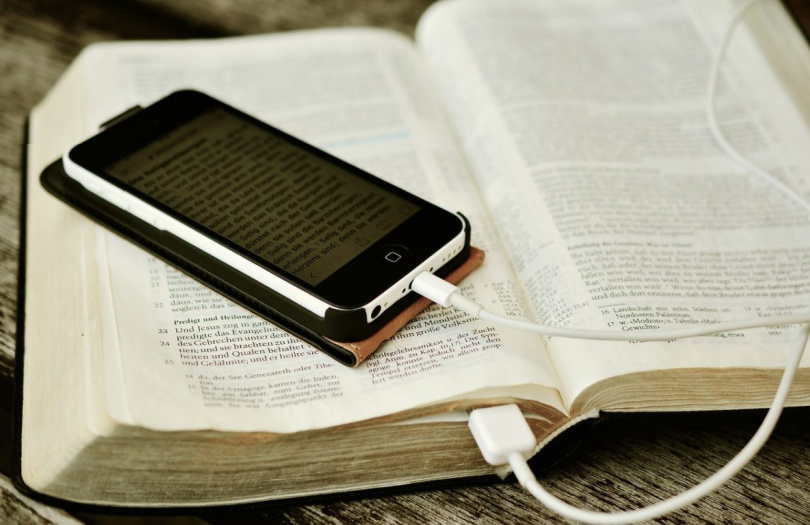
“For the word of God is alive and active. Sharper than any double-edged sword, it penetrates even to dividing soul
and spirit, joints and marrow; it judges the thoughts and attitudes of the heart. Nothing in all creation is hidden from God’s sight. Everything is uncovered and laid bare before the eyes of Him to whom we must give account.” (Hebrews 4:12-13)

It is no surprise that in a digital age people rely more and more on digital products to help them navigate through the daily demands of life. Banking, socializing, collecting and storing memories, shopping, and more, are now done in an ever-increasing degree on a person’s phone. It is no shock, therefore, that this would also be true for disciples. Our modern-day phones can be powerful tools. With a processing power of over 5,000 times faster than the super computers of the 1980’s, our phones can be used for so many useful and spiritual purposes. However, one thing your phone should not often be used for is your Bible.
The Bible compares itself to a first-century Roman double-edged sword, which was primarily used for piercing through thick armour and into
the vital organs of one’s enemies. This is a fair comparison, since the Bible is meant to cut deep, and to reach the heart. It is also double-edged, meaning it hurts but it is good – much like the effect of a surgeon using his scalpel to penetrate through a person’s tissue for a life saving surgery. That surgery would obviously hurt, but we would perceive it as a good thing.

If the Bible compared itself to a double-edged sword in the first-century, to what could we compare a digital Bible on a person’s cell phone
in this generation? Perhaps a fair comparison would be a Swiss Army Knife. Full of helpful gadgets, a Swiss Army Knife is the perfect tool
in some situations. For example, it is useful for camping because our access to things like can-openers, tweezers, files, screwdrivers,
etc… may be limited. However, we would never run into a sword fight with a Swiss Army Knife! Likewise, the following are ten other reasons not to use your phone for your Bible unless you have no other options.
1) Bible apps do not help with Bible memorization. Since most Bible apps have a list of the books of the Bible, as well as a handy search tool, there is no need to memorize the order of the books of the Bible, or where scriptures are at in the Bible. This can (and does) enable us to
get away without memorization. Jesus’ memorization of scripture is what helped Him fend off Satan’s attacks in the desert. (Luke 4:1-13) So to not memorize scripture as a disciple is a significant problem. Also, God commands us to write His commandments on our hearts. (Deuteronomy 6:6) We must not allow our phones to make us lazy in memorizing scripture, and the location of scripture or books of the Bible.
2) Physical Bibles don’t require good reception. Imagine sitting down to do a Bible study with a non-Christian. They are excited to open up the Bible and learn about God for the first time, and you are excited to teach them. You make small talk for a while, and then open up your Bible study with a prayer. Then you proceed to pull out your cell phone, and open up the Bible app, only to see a blue circle spinning on your screen over and over again. Enough said.
3) Your physical Bible does not interrupt your reading with notifications. Whether your phone is set to silent or not, our phones are designed to capture your attention. Text messages, emails, social media likes or comments, and so many other things, can unapologetically disrupt any
attention your attempting to give to your Bible.
4) No one knows whether you are reading your Bible or looking at Facebook. Since our “[watching our] life and doctrine closely” is such a necessary part of winning souls, (I Timothy 4:16) it is important that others see us reading our Bible, and following along in sermons. But if you are using the Bible app on your phone, who can tell what you are doing? We must make sure that our face is in “the good book” and not on Facebook!
5) Your physical Bible doesn’t run out of battery. There is no need to plug in your Bible. As it says, “Faith comes from hearing the message.” (Romans 10:17) So we can be sure that it is already fully charged! The same cannot be said about your cell phone, though. As its power dwindles– 20-percent, 10-percent, low-power mode – so does your ability to gain faith from it. So stop plugging in your phone, and start plugging into your physical Bible!

6) Your Bible actually shares its faith. Have you ever been reading your Bible at a coffee shop, and then someone comes up to you and says something like, “Wow, you’re reading the Bible! That’s cool. I’ve been wanting to get back into the Bible.” It is not necessarily super common, but it has been known to happen. Unfortunately, reading the Bible on your phone does not get the same response because no one can see what you are reading.
7) Doing a Bible study from memory impresses people. One of the ways we can earn credibility as we attempt to win souls for Christ is to really know the Bible. I for one would not want to learn all about dieting and nutrition from someone who is overweight. Similarly, we cannot expect that people would want to learn the Bible from us if we do not appear to know it very well. When we use our phones to teach, we lose the ability to impress people by what we know. This is not for the sake of impressing them, but for the sake of winning them for Christ.
8) Switching back and forth from Zoom to your Bible app can disrupt a virtual Bible study. Ever since the pandemic in 2020, more and more disciples have relied on Zoom to do Bible studies. This can be a very helpful tool, especially in a city where it is often hard to get from one place to another in a reasonable amount of time. However, when someone is using Zoom on their phone as well as a digital Bible, the video feed cuts off when they switch between the apps. This can have a negative effect on a Bible study whereas using a physical Bible does not.
9) A physical Bible can be given as a gift. One of my all-time favourite Bibles was the 1983 NIV Cambridge Bible I was given when I was appointed as an evangelist in 2014. I eventually passed this Bible on to one of my sons-in-the-faith, Isaiah Famurewa! Isaiah still has (and uses) this particular Bible, and I’m sure he will pass it along one day as well!
10) Your Evangelist would be very encouraged if everyone could use their physical Bibles instead of their phones! (Hebrews 13:17) Perhaps I’m just old-school? Maybe at some point it will become more advantageous to use a digital Bible in an ever increasing digital age? But until that time comes, let’s bring into the fight a true double-edged sword, and not a dinky Swiss Army Knife! To God be the glory!

Evan Bartholomew
